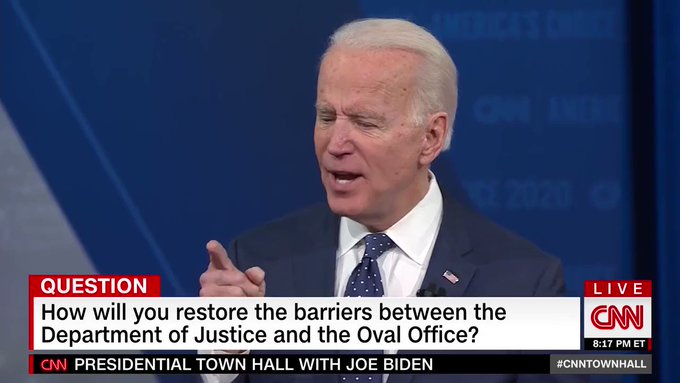Democrat presidential candidate Joe Biden could not remember what his late son Beau Biden did for work during a CNN town hall event on Thursday night, falsely claiming that his son was “Attorney General of the United States.”
“Never direct the Justice Department as to who they should or should not indict and under what circumstances they should or should not,” Biden told the audience at the event. “That is an independent judgement to be made.”
“My son, the one who, my deceased son, was the Attorney General of the United States,” Biden falsely claimed, adding, “and before that, he was a federal prosecutor in one of the largest offices in the country in Philadelphia.”
“And I’ll tell you what, he wouldn’t even talk to me about anything he was doing – his father – and he shouldn’t have, and I didn’t have any control over either one of those things,” Biden added.
Biden’s son was not the Attorney General of the United States; he was the Attorney General of Delaware.
WATCH:
FACT CHECK FOR JOE BIDEN:
Your son was not the "Attorney General of the United States."
223 people are talking about this
The Daily Wire highlighted Biden’s stances on policy issues in a profile piece last September:
Constitution: As chairman of the Senate Judiciary Committee from 1987–1995, Biden oversaw two of the most contentious U.S. Supreme Court nominations in recent memory: Those of Reagan nominee Robert Bork and Bush nominee Clarence Thomas. Along with Sen. Ted Kennedy (D-MA), Biden helped orchestrate and lead the personally nasty, full-frontal assault that ultimately resulted in the Bork nomination’s failure. Biden’s legislative posture has indicated an expansive view of congressional regulatory power: He helped lead the passing of the Violence Against Women Act, which was partially invalidated on constitutional grounds by the U.S. Supreme Court in 2000.
Economy: Biden is best described as a Keynesian who believes in the purported economic benefits of large-scale government investments and deficit spending. Along with then-President Obama, Biden shepherded through a massive fiscal stimulus package in the duo’s first year in office, oversaw the passing of the regulation-heavy Dodd-Frank Wall Street Reform and Consumer Protection Act, dramatically expanded the national debt, and hiked income taxes on the wealthy. Biden has long been supportive of a greater federal role in infrastructure spending. On the issue of trade, Biden voted for NAFTA in 1993. Biden has opposed the privatization of Social Security.
Health Care: Along with Obama, Biden helped oversee the 2010 passing of the Patient Protection and Affordable Care Act — also known as Obamacare. Obamacare radically reshaped the individual market for health insurance, infamously included a tax/mandate to purchase health insurance, and generally dramatically expanded the role of government in the regulation and provision of health care. There is likely no Obama/Biden agenda item that conservatives have more consistently opposed than Obamacare. Biden has never indicated any willingness to structurally reform fiscally ruinous health care-related entitlement programs, such as Medicare and Medicaid. As part of his 2020 presidential nomination platform, Biden has claimed opposition to “Medicare for All.”
Immigration: Biden voted for the George W. Bush-era Secure Fence Act of 2006, but has also consistently supported amnesty policies throughout his career — including the Comprehensive Immigration Reform Act of 2007 and the failed “Gang of Eight” immigration bill in 2013. Biden served as vice president when Obama issued two major unilateral executive amnesties, DACA in 2012 and DAPA in 2014 — each of which has been fiercely opposed by conservatives and has been challenged in high-profile lawsuits.
Foreign Policy: Biden has cultivated a largely dovish foreign policy profile, although he did vote in favor of authorizing the Iraq War in 2003. As vice president, Biden was a leading proponent for and cheerleader of President Obama’s 2015 nuclear agreement with Iran — a deal which flushed the terror-supporting mullahs’ coffers with cash and did not place any restrictions whatsoever on Iran’s non-nuclear ballistic missile program. During his 2008 presidential campaign, Biden pushed hard for a solution to the Iraqi quagmire that divided the troubled nation into discrete Sunni, Shiite, and Kurdish semi-autonomous sections. Although a self-described friend of Israel, Biden has often been harshly critical of Israel’s treatment of the Palestinian-Arabs and allegedly once threatened to cut off U.S. aid to Israel. Along with Obama, Biden as vice president took steps to loosen the U.S.’s longstanding embargo on Cuba, although the U.S. received no tangible concessions from Cuba’s communist dictatorship before doing so.
Abortion: Biden described himself as “personally pro-life” while nonetheless believing that Roe v. Wade was correctly decided and that women have a constitutional right to abortion. For decades, Biden supported the Hyde Amendment — which prohibits federal funding of abortion — but flipped his position in 2019 to appease the hard-left Democratic activists who now comprise the base of the party.
Guns: Biden was a leading proponent and sponsor of the federal “assault weapons” ban, a subset of the Violent Crime Control and Law Enforcement Act of 1994. Throughout his career, he has generally been supportive of curtailing Second Amendment rights. Biden has also supported mandating five-day waiting periods for gun purchases, as well as closing the alleged “gun show loophole.” Biden supports a ban on the undefinable sub-class of firearms referred to as so-called “assault weapons” — a line of thought that, if taken to its logical conclusion, could lead to the banning of all semi-automatic firearms in America.





Post a Comment